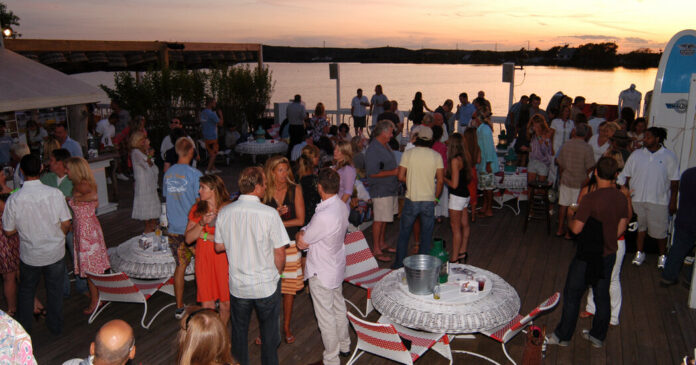Whether it's complaints about air traffic at East Hampton Airport, partying teenagers on the beach, or the arrival of Uber and Lyft drivers, the controversies that dominate the news cycle on the East End of Long Island, NY, usually revolve around one thing: noise – and who gets to make noise in a place where residents are used to getting almost anything they want.
This summer, the media is setting off fireworks over Zero Bond, the members-only club in Lower Manhattan that plans to open a branch here four years after it became the ultimate downtown status symbol — the place that Page Six wrote about because Kim Kardashian and Pete Davidson went on their second dates there, Gigi Hadid celebrated her 27th birthday there, Elon Musk hosted his Met Gala after-party there, and Eric Adams felt at home there during his 2021 mayoral campaign.
Much like a Birkin bag, Zero Bond's appeal comes (at least in part) from how difficult it is to get hold of. As founder Scott Sartiano said, “You can't buy cool.”
Money does help: After submitting an application, a letter of recommendation from a current member and a headshot, anyone who wants to join the club must pay a one-time initiation fee and an annual dues that increase with the applicant's age. (People under 28 pay a one-time fee of $750 and $2,750 annually; people over 45 pay an initiation fee of $5,000 and $4,400 annually.)
There has been much coverage of Mr. Sartiano's efforts to open his private club in a century-old building called the Hedges Inn, which is currently a 13-room luxury bed and breakfast. Although he is reportedly negotiating the lease of the property, even city officials have no confirmation whether an agreement has been signed.
Mr. Sartiano declined numerous requests for comment. So did John Cumming, the owner of the Hedges Inn, although he emailed a statement saying that “the future of the Hedges Inn is an important and sensitive issue for all involved” and expressed confidence that “the next 40+ years of this iconic inn will be as bright as its past.”
As the lease stands now, many neighbors are not happy. On May 18, East Hampton Village Mayor Jerry Larsen and the Board of Directors, in their latest salvo, passed a law requiring restaurants in the historic district to close by 11 p.m. and all patrons to be out, which would dampen Zero Bond's business should the club move its lease. (Mr. Larsen had hoped to enforce a 10 p.m. curfew but faced opposition from area restaurants.)
When Sartiano began his campaign in March, he tried to win over the mayor of East Hampton by promising him that New York Mayor Eric Adams would call him and attest to his reliability.
“I told them not to waste Mr. Adams' time,” Mr. Larsen said. “It wouldn't change my mind.”
“One of the lost things in this world is quiet,” said Carrie Doyle, a village councillor. “People come out to find peace and quiet, and the irony is that you have to make a lot of noise to get there. And that's exactly what we did.”
But the dispute is about more than just decibel levels—it's also about access. One argument that's been made time and time again for keeping Zero Bond out of East Hampton has to do with the club's insistence on welcoming people it might not welcome as members in return. And the Hamptons are a particularly difficult place to make that argument.
No longer a quiet refuge
Almost everyone who visits the Hamptons can attest that the city long ago shed its reputation as a quiet haven where Jackson Pollock hid and overcame his existential despair with his paintings.
The Stephen Talkhouse in Amagansett has hosted shows by Jon Bon Jovi and Jimmy Buffett. The lines outside the bathrooms at the Surf Lodge in Montauk are legendary enough to inspire an article in the New York Times. And that didn't stop Malia Obama from celebrating her birthday on the outdoor patio.
Therefore, it made sense for Zero Bond to aim for a theatrical release in the Hamptons, says Corey Dolgon, author of “The End of the Hamptons” and sociology professor at Stonehill College in Easton, Massachusetts.
“The Hamptons – a symbol of the 'richest and most famous' – is exactly the kind of cultural capital Zero Bond craves,” he said. “Each new generation of the rich and famous wants to put their stamp on the land they conquer.”
Nevertheless, Mr. Sartiano has chosen a difficult location for his clubhouse.
“Montauk has all these hotels,” said Kathleen Cunningham, executive director of the Village Preservation Society of East Hampton. “There's a lot of commercial real estate, and that's one of the reasons there's a party scene here – because it can be. The commercial part of East Hampton is much smaller, and so what's allowed and what should be allowed is different.”
That said, while the Hamptons are no longer exactly quiet, the party scene is a shadow of what it was in the early 2000s, when Lizzie Grubman crashed her black Mercedes SUV outside a Southampton nightclub called the Conscience Point Inn, injuring 16 people.
“The era of big nightclubs is over,” said Nick Kraus, a partner at Talkhouse, listing a list of now-closed clubs that were known for their popularity with plastic surgeons and loathed for patrons' tendency to throw their plastic cups into the street. “These places have become Pier Ones or dog parks,” he said, adding: “The cities bought them because they were a nuisance and then rebuilt them.”
“I hate losing”
Among the residents concerned about the prospect of having Zero Bond as a neighbor is Kenneth Lipper, a former New York City deputy mayor under Ed Koch who became a titan of the financial world, serving as a partner at Lehman Brothers and Salomon Brothers before founding Lipper & Co., which manages investments for wealthy individuals. (He also wrote the novel “Wall Street,” which was made into a 1987 film by Oliver Stone.)
Mr Lipper, who lives on a side street a few hundred yards from the Hedges Inn, has been attending council meetings to protest against the leasing of the property to Mr Sartiano, including the meeting last week at which the 11pm curfew was set.
Although Mr Lipper said he was never really close to Mr Cumming, the relationship between them was always cordial. He also knew Mr Cumming's father, Ian Cumming, a billionaire investment banker who lived on the block and died in 2018 at the age of 78.
Last summer, he happened to meet Mr. Cumming at a party in the Hamptons. “He said he had to make money at the Hedges Inn,” Mr. Lipper recalled. “'Everything has to make money.' I just rolled my eyes.” He later added, “This is pure mental acrobatics. It has nothing to do with real business or real need.”
Mr. Lipper compared it to “Wall Street.” “It reminds me of that saying,” he said. “'Greed is good,' a kind of modern-day Gordon Gekko attitude.”
Mayor Larsen has presented the problem as if it were primarily about noise.
“Even the smallest sign, like cars idling in the parking lot next to a house, people talking in a parking lot late at night – after people have had a drink, sometimes they come out laughing and are louder than usual – all of that bothers neighbors because the houses are so close together,” he said.
Others have suggested that he may have a personal interest in keeping Zero Bond out of East Hampton.
In the past, the mayor has been decidedly pro-business, raising parking fees, introducing a plan to privatize emergency services and securing funds from Prada, which operates a store on Main Street, to pay for the lighting of the downtown Christmas tree – where Santa Claus arrived by police helicopter for the 2022 lighting ceremony.
But the possibility of a nightclub opening in a predominantly residential part of the village obviously poses a problem for him, says David Rattray, editor of the East Hampton Star, the town's main newspaper.
The position of mayor, Rattray said, is a side job that earns Larsen about $26,000 a year. His main source of income is Protec Security, a private security company he runs with his wife, Lisa Larsen.
“He has customers within earshot,” said Mr. Rattray, whose newspaper is based across the street from The Hedges. “His trucks are there every day.”
In fact, it was not difficult to spot triangular Protec signs on the lawns of numerous nearby houses: one less than a quarter mile from the Hedges on the corner of Main Street and James Lane; another on the house directly behind Mr. Lipper's; and others on Huntting Lane, Middle Lane, Egypt Lane and West Dune Lane.
When asked about a possible conflict of interest, the mayor more or less shrugged his shoulders. “If someone came before the board of trustees,” he said, and he had business dealings with that person, “I would have to recuse myself.”
Still, residents are bracing for a battle that could drag on into next summer, as everything will depend on a lease and a liquor license.
Liquor licenses issued by the New York State Liquor Authority allow businesses to sell alcohol until 4 a.m., but counties can further restrict those hours through their own laws. And that could lead to a potential legal battle between Mr. Sartiano and village officials.
But maybe not — at least not this summer — if Mr. Sartiano runs out of time to get the club up and running. Marcos Baladron, the East Hampton Village administrator, said there was no sign that Mr. Sartiano had signed a lease, let alone obtained a liquor license, a process that can take nearly a year. And the mayor noted that the state liquor board would consult with the community before granting Mr. Sartiano a license to serve alcohol.
But it remains a mystery to them why Mr. Cumming is so eager to do business with Zero Bond. “I told the owner, 'If you really want to sell the house, I can give you a list of people who would be happy to buy,'” Mr. Baladron said. “And none of them would do anything the village wouldn't be happy to see.”
However, he seemed to understand why Mr Sartiano does not want to give up.
Earlier this spring, Baladron said, he suggested that if Sartiano was determined to move to the Hamptons, there were far better places to go. “He could go to Montauk and not face any resistance,” Baladron said. “Instead, he's opening a store in a building that's not suited to what he wants to do — it's not even a good business decision.”
He remembered Mr. Sartiano's response: “I hate losing.”


















